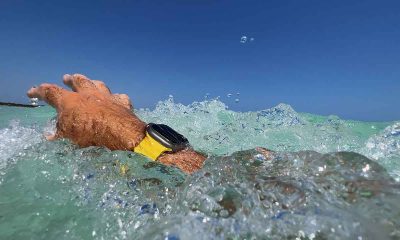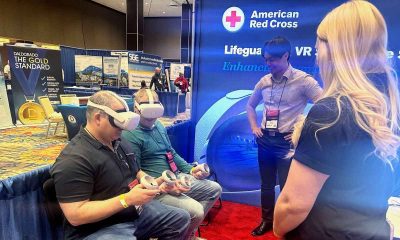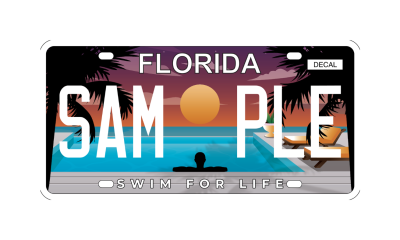Safety
‘NY SWIMS’ Program Aimed At Expanding Access To Curb Record Drowning Rates

In a groundbreaking move, Governor Kathy Hochul of New York has introduced the “NY SWIMS” initiative, aiming to enhance water safety across the state. The $60 million grant program is set to establish 10 new pools in underserved communities, with an additional $30 million allocated for pop-up pools during heat waves. This summer, the number of pools and beaches providing water safety instruction programs is expected to more than double, increasing from seven to 17.
One notable highlight of the initiative is the fast-tracking of a floating, self-filtering pool in New York City’s waterways. Initially proposed over a decade ago, the $16 million project, with $12 million from the state and $4 million from the city, will see the 9,000-square-foot +Pool become a reality. Shaped like a plus sign with an Olympic-sized setup, the pool will undergo testing this summer, likely in a location connected to the riverbed off Manhattan’s Lower East Side, anticipating a public opening next summer.
Governor Hochul also pledged to bolster lifeguard numbers statewide. Concerns arose at the start of the previous summer when New York City had only about one-third of the required 1,400 lifeguards to ensure swimmers’ safety.
The comprehensive plan was unveiled at a press conference on January 5, with Governor Hochul joined by New York City Mayor Eric Adams. Describing it as “the largest statewide investment in swimming since the New Deal,” the initiative is a response to alarming drowning rates in New York. The most recent data from 2021 revealed 230 deaths, prompting urgent action.
Mayor Adams emphasized the significance of the initiative, pointing out that drowning has become a leading cause of death, particularly among children aged 1 to 14. With New York City surrounded by water, Adams stressed the importance of teaching young people to swim. He highlighted the stark disparities, citing a 2017 survey indicating that one in three Black students cannot swim compared to one in 10 white counterparts.
Adams passionately shared his personal experience, recounting a lack of swimming facilities in his community, where a water hose and the hope for a turned-on fire hydrant served as makeshift pools. He drew attention to the stark contrast, likening Coney Island to the Hamptons for his community and Riis Beach to Martha’s Vineyard.
The “NY SWIMS” initiative builds on previous efforts, including legislation from September that provided free swimming lessons for second graders in the city. This transformative initiative aims not only to create new aquatic spaces but also to change mindsets and address historical inequalities in access to swimming resources.
Read the perspective of 13-year-old East Harlem resident Lucas Rosado as he shares his testimonial on the personal significance of the “NY SWIMS” initiative:
I’m Lucas Rosado, a 13-year-old Latino from East Harlem. Some of my earliest memories are swimming here at the Children’s Aid Milbank Center. I started swimming when I was five and became competitive when I was seven. And one of my favorite things to do is race at swim meets. I always have fun competing, making new friends and improving with my team.
During the pandemic, that all came to a stop. In that long period when I couldn’t swim, I realized just how important swimming is. It’s a valuable skill that teaches values like community, sportsmanship, hard work, discipline and perseverance In Latino and Black communities like mine, I think expanding swim programs would be amazing.
In these communities, a reduction in obesity and drowning rates is greatly needed, and providing young people access to pools and lessons will help them experience the numerous physical, mental and social benefits that swimming has to offer. Programs that increase pool access and swimming education like the Children’s Aid are great for building strong and healthy communities.
Swimming is also a social sport that allows you to meet new people and learn valuable skills like sportsmanship and teamwork. People who started as toddlers just learning how to swim eventually grow up to be coaches as adults all while maintaining lifelong friendships.
That comfort, shared by all ages and backgrounds here at the pool, is something more people need to experience, and I’m confident that Governor Hochul’s announcement will help achieve that for all communities. I hope everyone in New York can get a swimming pool near them and learn to love being in the water just like I do.
Pool News
Patent Pending Apple Watch SOS Feature Could Prevent Drownings
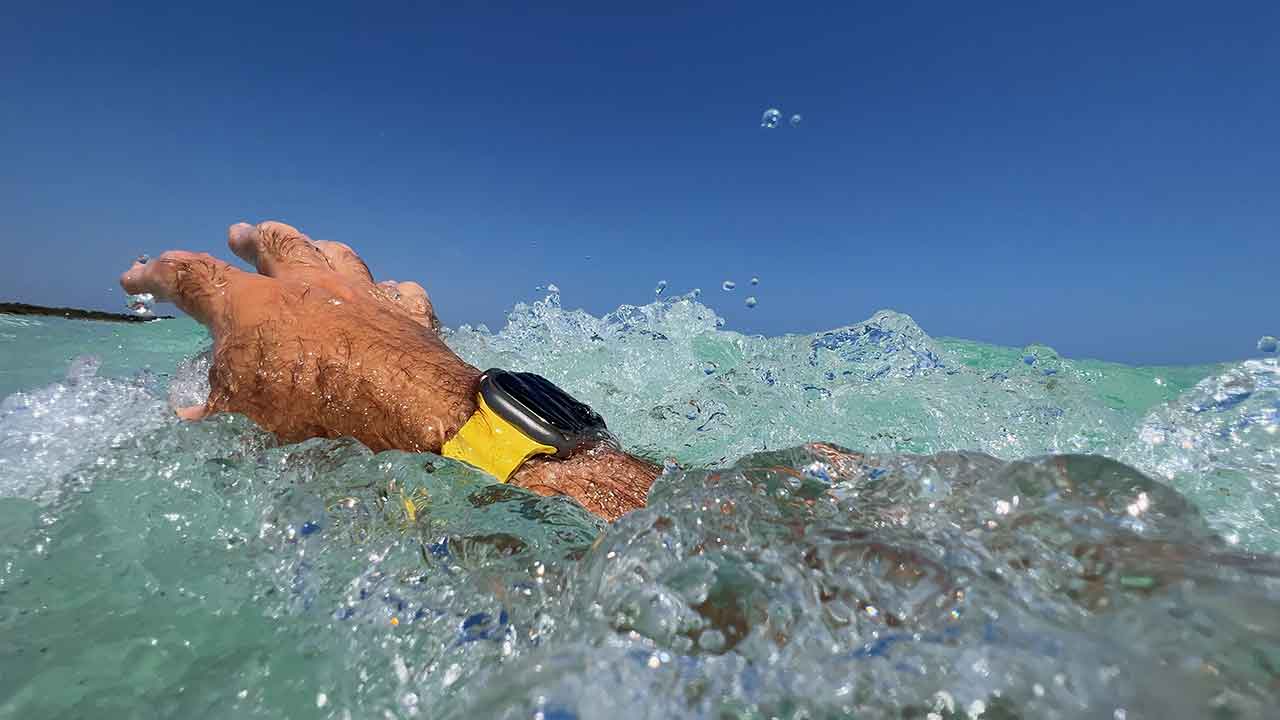
A forthcoming feature potentially destined for the Apple Watch, as detailed in a recent patent application, could serve as a lifesaver for swimmers at risk of drowning.
Outlined in the patent is a capability for the Watch to identify “irregular behavior” and automatically trigger a distress call for assistance.
Apple underscores the alarming statistics surrounding drowning, particularly its prevalence among children, as a leading cause of accidental fatalities.
In the United States alone, drowning claims the lives of over 3,500 individuals annually, ranking as the fifth most common form of accidental death. Tragically, a significant portion of these victims are children.
Emphasizing the critical importance of swift intervention during water emergencies, Apple highlights the dire consequences of prolonged submersion without resuscitation, which can result in brain damage and ultimately, drowning.
A Growing Need For Cost-Effective Wearable Solutions
While acknowledging existing underwater camera systems in some swimming pools aimed at detecting distressed swimmers and alerting lifeguards, Apple notes their costliness and unreliability.
Consequently, there’s a pressing need for a simpler, more cost-effective drowning prevention solution suitable for all types of water bodies, including public and private pools, as well as natural settings like lakes and ponds where installing underwater cameras is impractical.
The patent proposes leveraging wearable devices such as the Apple Watch for broader applicability, increased reliability, and the ability to detect various types of emergencies.
Alerting When Swimmers Are In Distress
For instance, if the Watch detects a wearer who is not proficient in swimming entering deeper water, it can promptly dispatch an alert instead of waiting for signs of distress.
These alerts can be transmitted to nearby devices, including those of friends and family, and seamlessly integrate with existing drowning detection and alarm systems to ensure lifeguards are promptly notified.
Apple Watches already boast capabilities to detect and respond to falls, vehicle accidents, and cardiac irregularities. Heartwarming testimonials featured in Apple’s “Dear Apple” video series show individuals whose lives were saved by these functionalities.
As with many patents from Apple, it’s important to note that not all concepts may materialize into actual products. Nonetheless, this innovation stands as a promising addition for potential integration into future watchOS updates.
Safety
Red Cross Releases Lifeguard VR Training Simulator
New Lifeguard VR Training app released by The American Red Cross provides enhanced surveillance and scanning training for lifeguards.
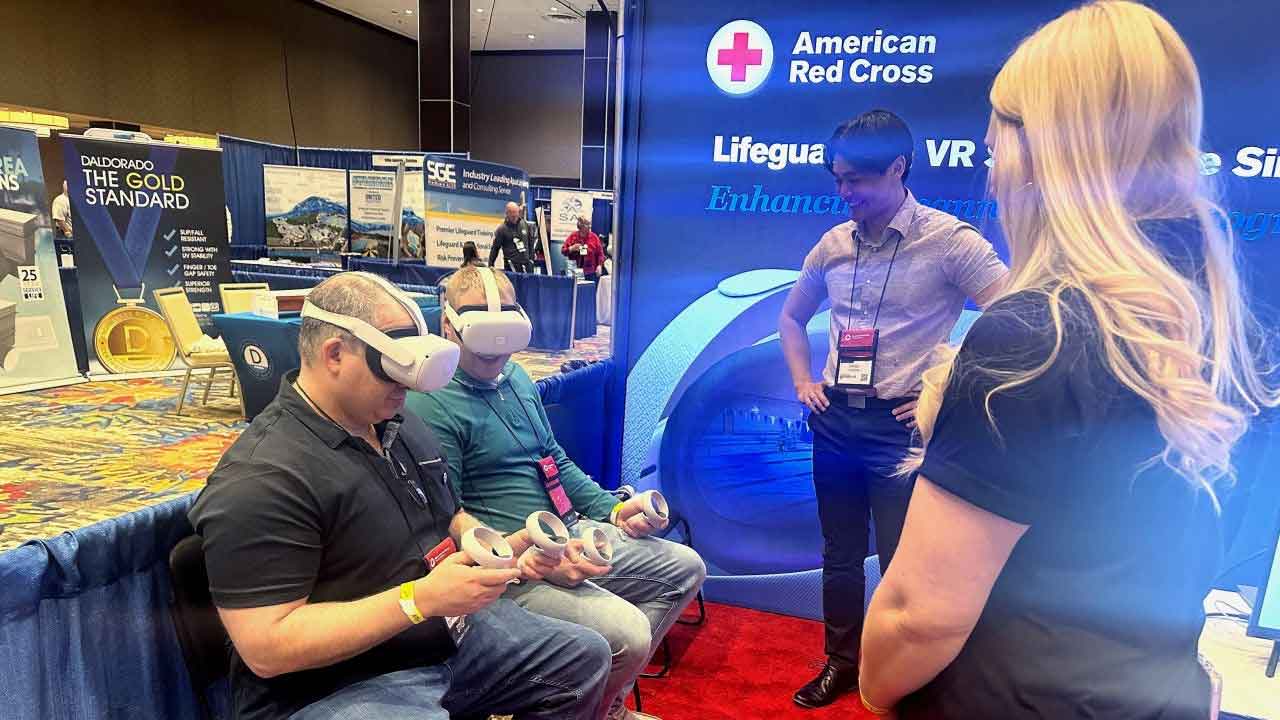
The American Red Cross has been a pioneer in water safety, aquatic science, certification, and instruction since 1914. Annually, its curriculum trains over 300,000 lifeguards, demonstrating its enduring commitment to ensuring the safety of swimmers.
Lifeguard VR Training: A Deeper Dive
Recently, The American Red Cross took a pioneering leap forward with the introduction of their new Virtual Reality (VR) lifeguard training simulator. This groundbreaking technology promises to transform the way lifeguards are trained, particularly in the crucial areas of surveillance and scanning skills, ultimately enhancing their ability to save lives.
At the recent Association of Aquatic Professionals (AOAP) show held in Reno, Pool Magazine had an opportunity to experience firsthand the innovative lifeguard training simulator developed by the American Red Cross in collaboration with Lucid Reality Labs. Chris Whipple, M.Ed., NREMT, a member of the Scientific Advisory Council of the American Red Cross, spoke about the significance of this technological advancement.
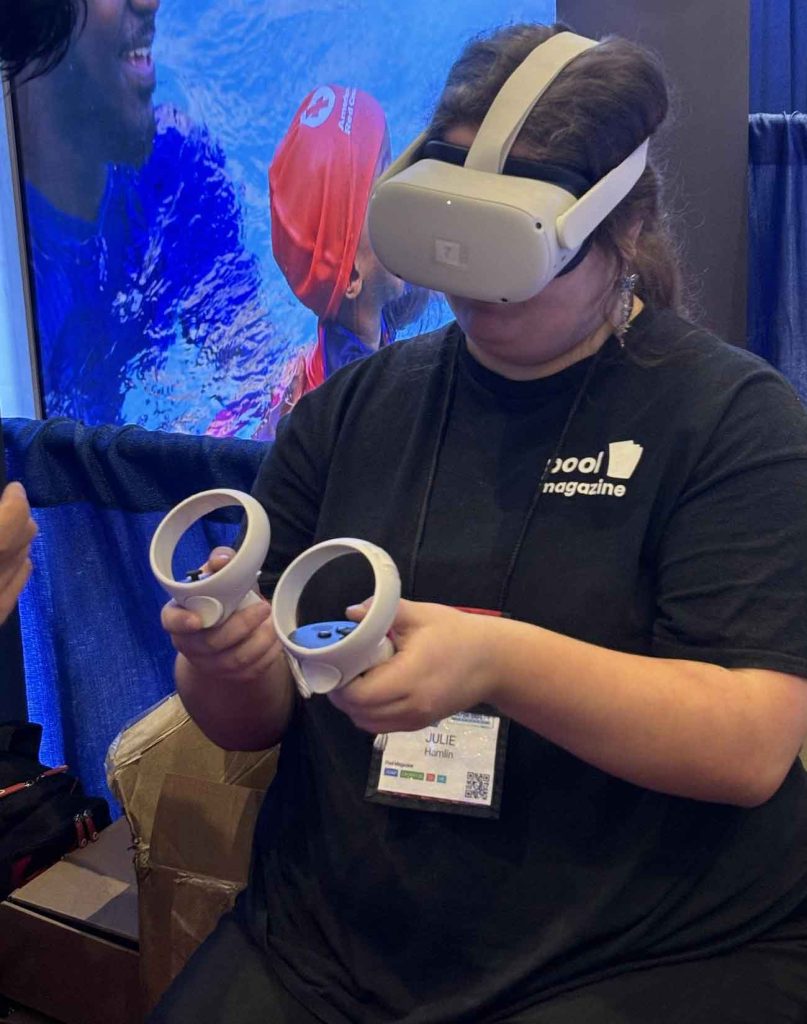
“The Red Cross, already the gold standard in water safety and drowning prevention, is enhancing lifeguard training for surveillance skills with the Lifeguard VR virtual reality tool,” stated Whipple, who explained how the tool will help provide effective scanning and surveillance skills that will assist them in identifying individuals in distress and help reinforce cognitive skills through immersive training scenarios.
How The Technology Works
Lifeguards can access the Lifeguard VR app, which offers a range of unique scenarios set in realistic aquatic environments, from the Meta Quest app store. The technology is compatible with all Meta Quest VR devices. In each scenario, lifeguards are placed on an elevated stand within their assigned zone and must swiftly identify individuals in need of assistance. By blowing a virtual whistle, they signal their recognition of the distressed person. Scores are calculated based on performance metrics that evaluate scanning and recognition abilities.
“The award-winning Lifeguard VR tool uses the best cutting-edge technology to ensure that lifeguards are at the top of their game, keeping facility patrons safe,” added Whipple.
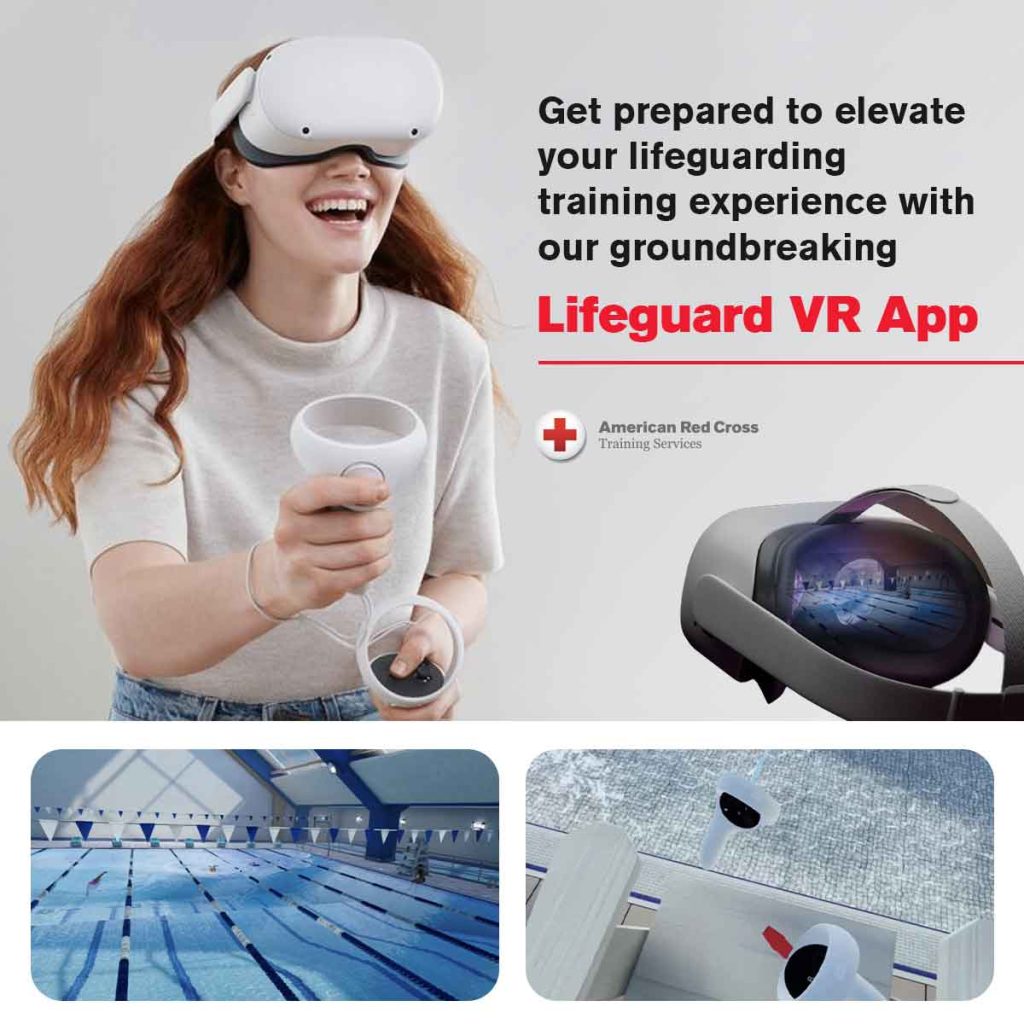
Tackling Real-World Problems
This VR lifeguard training simulator is designed to replicate real-world scenarios with remarkable accuracy. It incorporates elements such as typical water behaviors, drowning behaviors, and the presence of other patrons or swimmers. Lifeguards are also challenged by obstacles like lane ropes and floating features, mirroring the complexities they face in actual pool environments.
Moreover, the Lifeguard VR app provides valuable performance metrics, allowing trainers to track progress and identify areas for improvement. Heatmap data on scanning patterns, along with quiz and identification metrics, offer valuable insights into lifeguard competency at various stages of training.
“Lifeguard Instructors and supervisors can now provide dynamic scenarios set in a realistic pool environment to analyze surveillance and scanning skills, recognition of drowning response, and support first aid skills,” explained Whipple.
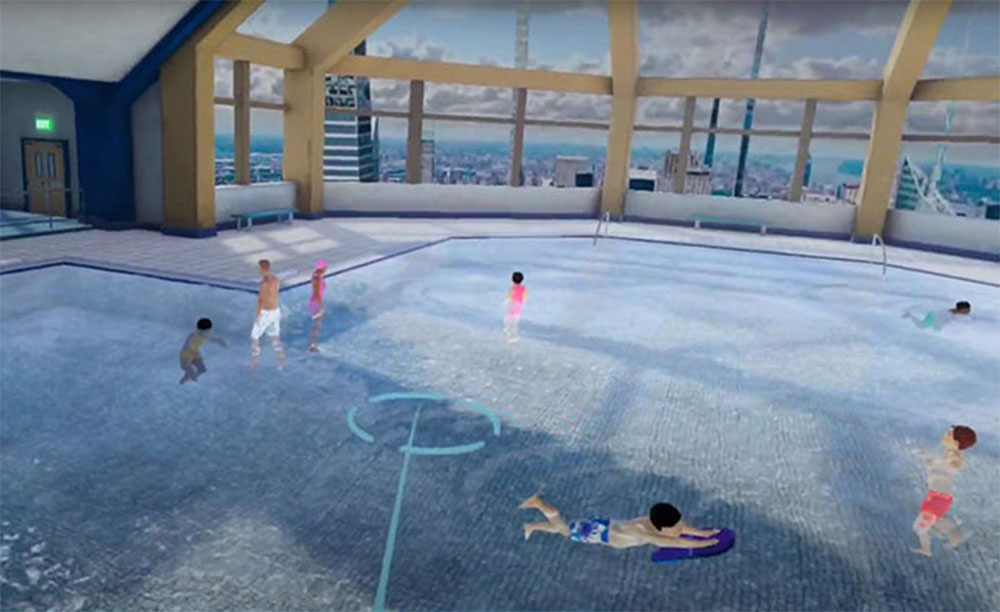
By harnessing the power of virtual reality, the American Red Cross aims to revolutionize lifeguard training, ensuring that lifeguards are better equipped to respond effectively to emergencies. This innovative approach not only enhances learning outcomes but also offers a more engaging and accessible training experience for lifeguards.
As Whipple aptly summarized, “With the new Red Cross Lifeguard VR app, lifeguards can practice and hone their skills taught in the classroom. By immersing users in dynamic, realistic drowning scenarios, lifeguards are able to improve learning outcomes while learning in an engaging, modern, and accessible way.”
In an era where technology continues to reshape industries across the board, the integration of virtual reality into lifeguard training represents a significant step forward in ensuring water safety and drowning prevention. The American Red Cross’s commitment to innovation underscores their dedication to excellence in safeguarding aquatic environments and protecting lives.
Photo Credits: The American Red Cross
Pool News
Hotel Pool Had Numerous Violations in Case Where 8-Year-Old Was Pulled Into Pipe

In the wake of a heartbreaking incident at a hotel pool in northwest Houston, authorities are diligently investigating the circumstances surrounding the drowning of an 8-year-old girl. The incident occurred over the weekend and has sent shockwaves through the community.
Missing Girl Drowned in Hotel Pool According To Investigators
The young girl, identified by her family as Aliyah Lynette Jaico, was reported missing on Saturday evening around 6 p.m. The last sighting of her was near the lazy river-style pool at the DoubleTree by Hilton Houston Brookhollow located at 12801 Northwest Fwy. Despite frantic efforts by her family to locate her, including thorough searches of the pool area, Aliyah remained unaccounted for.
Tim Miller, the founder of Texas EquuSearch, revealed that security footage showed Aliyah entering the water but never resurfacing. This discovery prompted a comprehensive investigation into the pool’s infrastructure. Utilizing cameras affixed to long poles, authorities drained the pool to inspect its piping system.
What they uncovered was harrowing: Aliyah had been pulled approximately 20 feet into a pipe with a diameter of about 16 inches. Despite exhaustive efforts by the Houston Fire Department and emergency responders, it took nearly 13 hours to access the pipe and retrieve Aliyah’s lifeless body.
Further scrutiny into the hotel’s facilities revealed concerning findings. Reports from the Houston Health Department’s inspection conducted on Monday outlined multiple violations.
“Main drain document was provided and still valid. However small pool has 32-inch channel drains on the walls, without a valid document stating their function, date of installation and date of expiration. A full inspection was conducted, multiple violations were observed. Video footage is available, however manager stated that the footage is being reviewed by legal, and we would have to wait to receive a copy,” part of Monday’s report read.
Hotel Pool Had Numerous Violations
March 2024 Report
03-25-2024 Aquatic Facility Inspection Report by info on Scribd
June 2023 Report
06-06-2023 Aquatic Facility Inspection Report by info on Scribd
March 2023 Report
03-09-2023 Aquatic Facility Inspection Report by info on Scribd
September 2022 Report
09-15-2022 Aquatic Facility Inspection Report by info on Scribd
September 2021 Report
09-29-2021 Aquatic Facility Inspection Report by info on Scribd
As investigations continue, questions linger regarding the adequacy of safety measures at the hotel’s pool and the potential oversight in maintenance protocols. The loss of the young victim has cast a somber shadow over the community, prompting calls for enhanced vigilance and stringent adherence to safety standards to prevent such tragedies in the future.
Featured Photo Credit: Google Maps
-

 Pool News4 weeks ago
Pool News4 weeks agoLandslide Damages Homes, Destroys Swimming Pool in California
-

 Manufacturer2 weeks ago
Manufacturer2 weeks agoSRS Distribution Announces Next Phase of Growth by Combining with The Home Depot to Better Serve Professional Customers
-

 Pool News4 weeks ago
Pool News4 weeks agoFluidra Launches €20 Million Venture Capital Fund – Fluidra Ventures
-

 Cleaning and Service Equipment and Supplies2 weeks ago
Cleaning and Service Equipment and Supplies2 weeks agoRecent Leslie’s/Harris Poll Study Shows Nearly Three-Quarters of Americans Mistakenly Assume Clear Pool Water Is Clean, Swim-Safe Water
-

 Manufacturer4 weeks ago
Manufacturer4 weeks agoBofA Downgrades Latham Group Citing Weak Pool Construction Market
-

 Pool News2 weeks ago
Pool News2 weeks agoHotel Pool Had Numerous Violations in Case Where 8-Year-Old Was Pulled Into Pipe
-

 Pool News5 days ago
Pool News5 days agoEarthquake in Taiwan Causes Waterfall From Rooftop Pool
-

 Equipment Supplies3 weeks ago
Equipment Supplies3 weeks agoFWP Faces Class Action Lawsuit Stemming From 2023 Cyberattack



